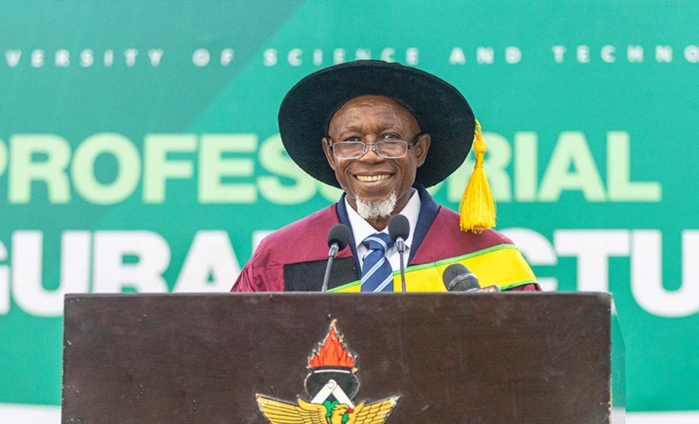An economist at the Kwame Nkrumah University of Science and Technology (KNUST), Kumasi Prof. Mohammed Hadrat Yusif, has called for sweeping reforms to Ghana’s monetary policy framework, including granting operational independence to the Bank of Ghana (BoG).
According to him, such reforms are essential to restoring macroeconomic stability and supporting long-term national development.
Delivering his Professorial Inaugural Lecture, Prof. Yusif examined Ghana’s monetary policy history and its persistent structural weaknesses.
The lecture, titled “Monetary Policy in Ghana: Revisiting the Tobin’s Model,” traced the economic divergence between Ghana and peer countries like South Korea and Malaysia, nations that were at similar levels of development at independence but have since outpaced Ghana in growth and stability.
“Ghana’s monetary policy has failed. Inflation is high, debt levels are unsustainable, and the infrastructure needed for sustainable development remains inadequate,” he stated.
Prof. Yusif observed that although the BoG was established in 1957 to stabilise prices, manage exchange rates, and control money supply, Ghana continues to face significant economic challenges.
He cited a sharp rise in public debt as evidence of policy failure. Domestic debt as a percentage of GDP, he noted, rose from 35% in 2016 to 90% in 2024, while external debt increased from 20% to 50% in the same period.
In 2024, Ghana’s inflation stood at 22.5%, compared to rates below 2.5% in countries like South Korea, Malaysia, and Singapore.
Prof. Yusif partly blamed the situation on what he described as the Ministry of Finance’s dominance over the central bank, which he argued undermines the BoG’s independence.
“The Bank of Ghana should be allowed to operate free from political interference. Monetary policy must be compatible with the broader macroeconomic goals of the country,” he said.
Among his proposals were a shift from inflation targeting to nominal GDP targeting, a review of the Fiscal Responsibility Act (2018) and the Bank of Ghana Act (2002), and greater investment in research and development.
He also called for deeper collaboration between the BoG and academic institutions such as KNUST to support evidence-based policy making.
Prof. Yusif underscored the importance of public-private partnerships for infrastructure development, responsible gold and cocoa production, and stronger support for small and medium enterprises (SMEs), especially in the context of the Africa Continental Free Trade Area (AfCFTA).
Latest Stories
-
Over 15m Ghanaians enrolled in NHIS – Health Minister
4 minutes -
Vice President and Health Minister back Entrance University’s vision for healthcare transformation
5 minutes -
Health Minister vows to complete health projects across Ghana
8 minutes -
Galien Africa, REMAPSEN partner to promote health and environment in Africa
13 minutes -
60-year-old man jailed 20 years for killing wife in front of 4-year-old son
16 minutes -
25% of streams in Ghana are from other African countries but Nigeria prefers homegrown music more
22 minutes -
Ghana pilots first vitamin-rich Acerola plantation for economic and health benefits
25 minutes -
UN Climate Change calls for urgent action to scale up climate finance at African Ministerial Dialogue
30 minutes -
Gov’t clears 10,000 health worker backlog, prioritises pharmacist recruitment – Akandoh
31 minutes -
Tap-Dom crowned Ghana’s leading AI innovator at 2025 QHSE Awards
33 minutes -
Gov’t working to clear backlog of 70k unemployed health workers – Akandoh
33 minutes -
NHIS revenue hits GH₵9.76b after uncapping levy – Health Minister
34 minutes -
21 more Mpox cases recorded; total now 218
41 minutes -
Students Loan Trust Fund reimburses academic fees of Over 60,000 freshmen for 2024/2025
50 minutes -
CTVET reaffirms commitment to digital-driven TVET reforms at World Youth Skills Day Dialogue
55 minutes

